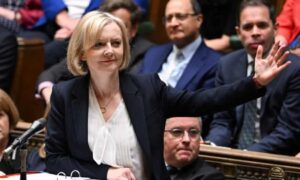
Raw free-market economics is missing in action. Somewhere between its 1980s ascendancy and today, the media, politicians, civil service and even the corporate mainstream abandoned small government and low taxes.
At the heart of Liz Truss’s new book, Ten Years to Save the West, the former prime minister reckons this is the reason for Britain’s economic drift, alongside “unelected technocrats” overruling the “wishes of the people”.
The UK’s main economic institutions – the Treasury, Bank of England and the Office for Budget Responsibility (a “three-headed hydra”) – come under fire for standing in the way of her project, launched not with an election mandate but a Tory party selection process.
However, could there be other lessons from Truss’s 49 days in power – measurable in the shelf life of a lettuce – unacknowledged in a book with more pages?
Bond market meltdown
“There was no word of warning about any likely issues with the bond markets, and no one mentioned the issues surrounding liability-driven investments.”
The trouble is, this does not appear to be entirely true. Truss’s own economic advisers warned her that markets could crash if her policy changes were not handled with care.
Weeks before the mini-budget her team presented her with a paper that said: “The markets are nervous about the UK and about policy options. If immediate economic policy announcements are handled badly then a market crash is possible.”
Pensions crisis
Truss could more reasonably claim ignorance over liability-driven investments (LDIs). The Financial Times had sounded the alarm two months earlier, but it still remained a relatively obscure corner of the pensions market.
But to blame LDIs puts the cart before the horse. “It really was a tinderbox waiting for a spark – and the market upheaval provided it,” writes Truss. But what triggered that market upheaval?
Government bond yields had been climbing in the summer of 2022 as the world’s leading central banks raised interest rates to combat soaring inflation after the Russian invasion of Ukraine. But the mini-budget triggered a far more extreme jump in the UK, in a development labelled the “moron premium” by City economists.
Over four days, long-dated government bond yields rose by more than the annual increase in 23 of the past 27 years, in a “doom loop” as the financial crisis started to feed on itself before the Bank of England stepped in.
